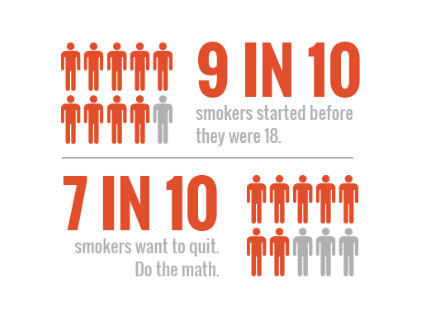
Smoking and Mental Health: A Topic Not Given Enough Attention

Once upon a time, it wasn’t known that cigarettes were a killer. However, these days it is printed on every packet of cigarettes, printed in articles, stated in adverts and taught at schools. In the ’70s, 54% of the UK population was smoking. Today, only 19% of the UK population is smoking. There are Health campaigns that are striving to help reduce the prevalence of smoking and all sorts of societies formed to help provide support to those quitting the habit. Here we take a look at the relationship between smoking and mental health.
Smoking and Mental Health
 Interestingly, the numbers of the population with mental health issues who are smokers have not reduced in the last twenty years. Statistics show that 33% of those struggling with anxiety and depression are smokers. It is also shown through a number of studies that people with mental disorders smoke more heavily than other smokers. Back to the UK population, of the 10 million smokers today, over 3 million of them actually have a mental health condition. It has been documented that people with mental health issues display a shorter life expectancy than the general population, and the main reason for this finding is heavy smoking.
Interestingly, the numbers of the population with mental health issues who are smokers have not reduced in the last twenty years. Statistics show that 33% of those struggling with anxiety and depression are smokers. It is also shown through a number of studies that people with mental disorders smoke more heavily than other smokers. Back to the UK population, of the 10 million smokers today, over 3 million of them actually have a mental health condition. It has been documented that people with mental health issues display a shorter life expectancy than the general population, and the main reason for this finding is heavy smoking.
Giving Up When You Have a Mental Health Problem
While there isn’t any evidence that smokers who have mental health problems are not interested in quitting, the truth is that those with mental health issues face greater challenges in kicking the habit than those who don’t have issues. Quitting cigarettes doesn’t increase or exacerbate the symptoms of depression or anxiety, and can even actually help improve them. However, the addiction and dependence on cigarettes over years of using it as a form of self-medication in times of tension or stress can make it intensely challenging both physiologically and psychologically for a person with mental health issues. Further, the lack of targeted support makes it particularly difficult. There aren’t support groups specifically targeted at mental health patients or sufferers to help them quit smoking.
Smoking and Depression
 Those who battle with depression have a chemical imbalance in their brains. This is because they have lower levels of dopamine, a natural brain chemical that is released in the brain. The release of dopamine triggers feelings of happiness. This is why people with depression do not feel positive feelings. How smoking fits into the equation is that cigarettes contain nicotine and the nicotine stimulates dopamine production, offering cigarette smokers a short-lived high. Over time, smoking actually makes the brain stop naturally producing dopamine, making the supply of dopamine decrease. This is what keeps smokers coming back to smoke more and more.
Those who battle with depression have a chemical imbalance in their brains. This is because they have lower levels of dopamine, a natural brain chemical that is released in the brain. The release of dopamine triggers feelings of happiness. This is why people with depression do not feel positive feelings. How smoking fits into the equation is that cigarettes contain nicotine and the nicotine stimulates dopamine production, offering cigarette smokers a short-lived high. Over time, smoking actually makes the brain stop naturally producing dopamine, making the supply of dopamine decrease. This is what keeps smokers coming back to smoke more and more.
Smoking and Anxiety
Most smokers claim that the reason they smoke is because of stress. Smoking is typically used as a means of controlling stress and turning to cigarettes helps smokers deal with stressful situations or a stressful lifestyle. This is a common misconception since smoking actually increases tension and anxiety. This is because not having a cigarette for a long time triggers irritability and anxiety.
Tips For Quitting for Good
 The most unsuccessful means of quitting smoking it by giving it up all of a sudden – or cold turkey, as it is called. This method is not sustainable and rarely works out for long term results. Planning ahead is far more successful. It is best to focus on all the many advantages of quitting, like better health, fresher breath, increased concentration, more money to spend on other things. Writing down the benefits can serve as motivation. It is also helpful to find other ways of coping with stress, like taking up exercise, a new hobby or changing your diet. Engaging in yoga or meditation or even going for massages or acupuncture can help. Reward yourself for days that you stay away from smoking with something that makes you happy. Find support from communities of other people giving up smoking as well. If necessary, use E-cigarettes to help you ease yourself out of cigarettes, as they are cleaner sources of nicotine than cigarettes. There is also nicotine replacement therapy and nicotine patches and a variety of homeopathic medications to also assist those who are trying to quit.
The most unsuccessful means of quitting smoking it by giving it up all of a sudden – or cold turkey, as it is called. This method is not sustainable and rarely works out for long term results. Planning ahead is far more successful. It is best to focus on all the many advantages of quitting, like better health, fresher breath, increased concentration, more money to spend on other things. Writing down the benefits can serve as motivation. It is also helpful to find other ways of coping with stress, like taking up exercise, a new hobby or changing your diet. Engaging in yoga or meditation or even going for massages or acupuncture can help. Reward yourself for days that you stay away from smoking with something that makes you happy. Find support from communities of other people giving up smoking as well. If necessary, use E-cigarettes to help you ease yourself out of cigarettes, as they are cleaner sources of nicotine than cigarettes. There is also nicotine replacement therapy and nicotine patches and a variety of homeopathic medications to also assist those who are trying to quit.
Quitting smoking will help even more if you have a problem with mental health related issues. You will enjoy clarity of mind and more focus and simply feel better. The sense of accomplishment is worth the challenge of quitting, too!
More in Mental Health
-
`
5 Reasons Why Dad’s Side of the Family Misses Out
Family bonds are intricate and multifaceted, often creating a unique tapestry of connections. However, many people notice a peculiar trend: stronger...
July 12, 2024 -
`
A Quick Guide on How to Get Short-Term Disability Approved for Anxiety and Depression
Living with anxiety or depression poses unique challenges, particularly in the workplace, where stress can exacerbate symptoms. For many, short-term disability...
July 5, 2024 -
`
Why Do People Feel Sleepy After Eating?
Is feeling sleepy after eating a sign of diabetes? Well, not directly. There are many reasons why you feel drowsy after...
June 20, 2024 -
`
What Is High-Functioning Depression? Symptoms and Treatment
High-functioning depression may not be a term you hear every day, but it’s a very real and challenging experience for many....
June 13, 2024 -
`
Kelly Clarkson’s Weight Loss Ozempic Journey – Debunking the Rumors
In a refreshing moment of transparency, Kelly Clarkson, the beloved singer and talk show host, sheds light on her remarkable weight...
June 3, 2024 -
`
What Is the Best Milk for Gut Health and Why?
In recent years, the milk section at the grocery store has expanded far beyond the traditional options. While cow’s milk has...
May 30, 2024 -
`
Do Dental Implants Hurt? Here’s All You Need to Know
When you hear “dental implants,” you might wince at the thought of pain. But do dental implants hurt as much as...
May 24, 2024 -
`
5 Key Differences Between A Psych Ward & A Mental Hospital
Curious about the differences between a psych ward and a mental hospital? You are not alone. With the mental health conversation...
May 16, 2024 -
`
It’s Official! “Selling Sunset’s” Christine Quinn & Husband Christian Dumontet Are Parting Ways
Have you ever found yourself unexpectedly engrossed in the personal lives of celebrities, especially when their stories take dramatic turns? Well,...
May 9, 2024










You must be logged in to post a comment Login